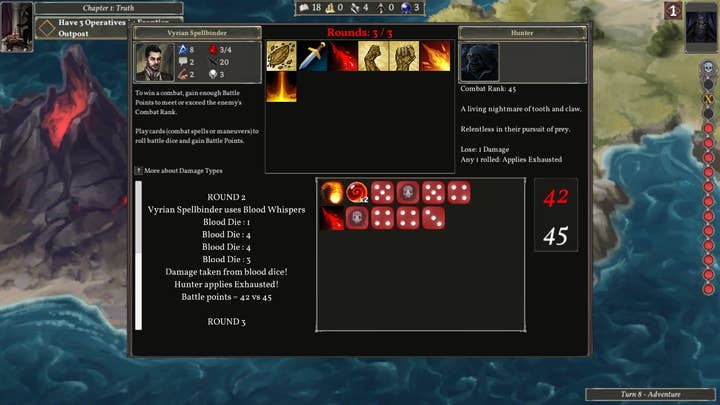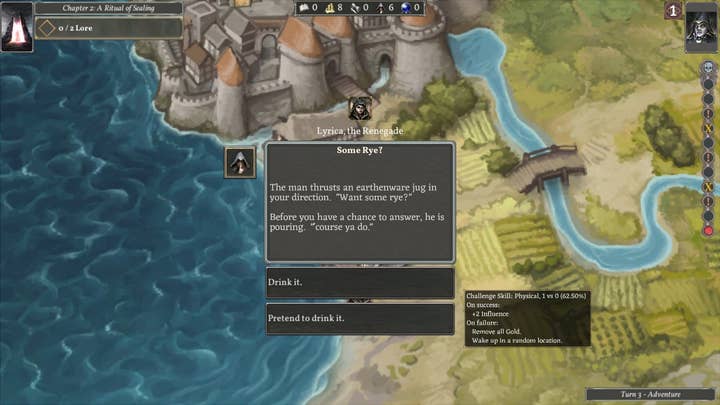A cursory look at C Prompt
Ex-Age of Empires, System Shock developers avoiding spiritual successors, treading new ground in debut effort Heretic Operative
Ian Fischer and Rob Fermier have impressive resumes. Fermier's roots in development stretch back to the mid-'90s and Looking Glass Technologies, where he was a programmer on System Shock. He co-founded Irrational Games and was lead programmer on System Shock 2. He then jumped to strategy game developer Ensemble Studios, where Fischer had worked on the seminal real-time strategy game Age of Empires.
The two first collaborated on Age of Mythology at Ensemble, and have worked together ever since, together jumping ship from Ensemble offshoot (and Orcs Must Die developer) Robot Entertainment earlier this year in order to found their new independent studio C Prompt.
The expected thing to do would probably involve the words "spiritual successor," at least one of those highly regarded projects or studios, and perhaps a crowdfunding campaign. But speaking with Fischer last week, it seemed like C Prompt is less like a classic rock band putting together a reunion tour to play the hits, and more like a classic rock band putting out an album of new material that intentionally sounds nothing like their previous work.
As Fischer explained, he and Fermier had become a sort of de facto prototype team at Ensemble and Robot. And that meant they were oftentimes chasing down ideas that weren't really what those studios were best known for. (At Ensemble, they spent some time working on MMOs, including the never-announced Halo project.)
"We've had some success in prototypes, but both of those companies were built around different principles, and had people that were interested in different things," he explained.
"We built this mostly because Rob and I had been in companies for a long time, and we got to work on some great games, but we had other games we wanted to make"
That was a problem, both internally and externally. If a studio was known for one genre and approached a publisher with something different or high-concept, Fischer said it could be difficult to get buy-in, no matter how great the potential. (He pointed to Minecraft as one example of a phenomenal hit that could never have obtained traditional publisher funding, even with a playable prototype.)
And the closer a studio is to a AAA outfit with a large staff, the harder it becomes to sell the other developers on a different set of priorities than the company is known for.
"Rob and I tried to convince people about how much fun emergence can be, or how much fun player-generated narrative can be, and we were talking to people who didn't play those games, largely," Fischer explained. "Some of the things we wanted to pursue were not things people were very interested in. So we ran into a situation where we saw these opportunities and had a bunch of games we were passionate about going and making, and we had people we had worked with in some cases for multiple decades and it's hard to walk away from. But at some point, the passion for the games we wanted to make overtook that."
So in March, the pair left Robot Entertainment in order to pursue the ideas they wanted to work on that didn't seem a good fit for the company. So while their name recognition may be best leveraged these days to make a spiritual successor to one of the much loved projects of their past, that would be a self-defeating (if possibly better funded) endeavor.
"We didn't build a company to go after contracts to go work on stuff we didn't really want to work on," Fischer said. "We built this mostly because Rob and I had been in companies for a long time, and we got to work on some great games, but we had other games we wanted to make."
For example, there's C Prompt's debut game, Heretic Operative. Inspired by board games like Arkham Horror and Pandemic, the game is a narrative strategy-RPG designed to lets players build their own narratives through the course of a game. It's set in a fantasy world where magic is powerful, but corrupting. There's a cult that has embraced magic and looks to use it to bring about the end of the world, and a church intent on stamping out the supernatural and anyone who would attempt to use it. In between is the titular player, at the helm of a secret using just enough magic to oppose the cult but not so much as to draw the attention of the church or hopelessly corrupt its agents.

Heretic Operative is in a friends and family beta at the moment, but the wishlist page just went up on Steam and C Prompt plans to launch it in the first quarter of next year. That's not a tremendous amount of lead time to get the word out about the game, but it doesn't sound like C Prompt is going to be the sort of outfit to plan a meticulous multimedia marketing blitz for its titles.
"We're making things we're true to that are built on that set of principles we really like and enjoy working with. We feel like we're going to get an audience of players by not trying to be too cute, by not trying to do a bunch of business model tricks or anything like that, just by building games we enjoy playing built on those principles," Fischer said. "We feel we're going to find an audience of players like us who enjoy these kinds of things, and we're all right with that not being 20 million concurrent players. We're OK with that."
It helps that the company's scale is "tiny" right now, by Fischer's own admission. Heretic Operative had a team of roughly three people for most of development, with Fischer and Fermier turning to their rolodex of colleagues from the Ensemble and Robot days for specialist help as needed. Ideally, Fischer believes the company could grow to a dev team of 12-15 people.
Both Fischer and Fermier have previous experience starting up development studios, but Fischer said this time is a little different.
"Ensemble Studios was born out of a consulting company, so there was an established consulting company there first, and Ensemble was kind of an evenings and weekends project at the very start that broke out and became a full-on separate entity," he explained. "And Robot was born out of Ensemble's demise, starting out with projects from Microsoft on day one. So there was never a time where we were looking for where a deal was going to come from, who we were going to work with, and what our next project would be on.
"C Prompt started from just the two of us saying, 'Let's start a company and make some games.' This is out of pocket, primarily Rob and I paying for everything and starting a company on our own. It's not the same. We don't have a deal in place with anyone at this point."
One might think that would make the pressure higher this time around, but Fischer said it's just the opposite.
"If you're at Robot going to work every day and there are 50 or 80 people there and you know the decisions you make might cause those people to not have jobs or for their careers to not move forward as they should, those are the things that were the real nail-biters to us," he said. "You're responsible for a lot of people and you have to think those decisions through.
"At this point, Rob and I are gambling with our own money. This is the two of us, we know what we have on the line, and we're willing to take the risk. But it's much easier for us to risk ourselves than it is to know we have to be responsible for somebody else. When we get a little bit larger, we'll feel that same set of nerves again because we'll have a team working for us. That'll change, but for right now it's kind of fun because we don't have to worry about it as much."









